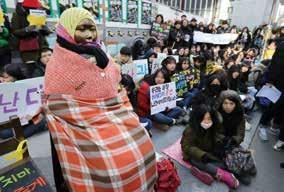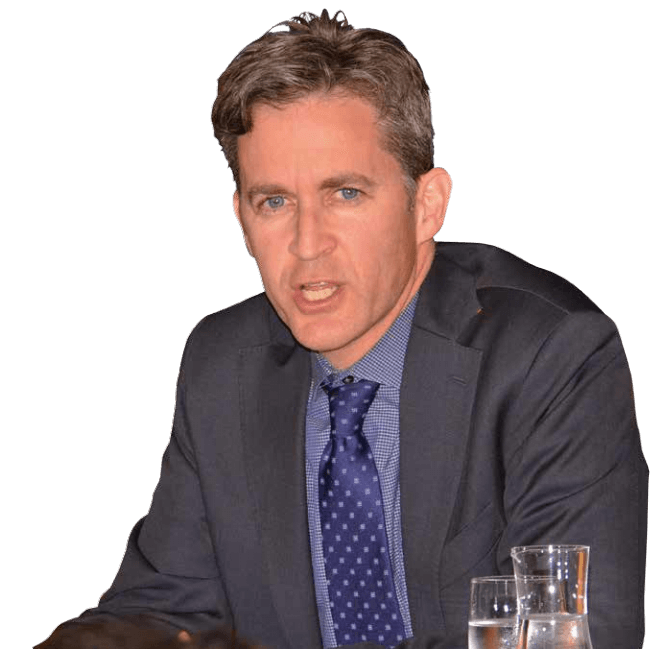Issue:
Best frenemies: Japan vs. the UN
Unlike countries that tend to bury unwelcome reports from the international body, the Japanese government takes them personally.
by DAVID MCNEILL
Blaring headlines seem to follow David Kaye. Earlier this year, on April 21, the UN’s special rapporteur for freedom of expression got a roasting in the British tabloids for warning that age verification for online porn could violate international laws on freedom of speech. “Meddling UN chiefs attack measures to protect kids from sick online filth,” screamed the Sun.
The response to Kaye’s report on Japan’s media was barely more measured. Days before he arrived in Tokyo to brief the government, a draft of the report was leaked to the Sankei Shimbun, a newspaper that also takes a dim view of finger wagging by meddling foreigners. Kaye’s report was shoddy and biased, it said. That was but a warm up for June 14, when the newspaper called him a liar.

Above, a statue in Korea to commemorate "comfort women:" the UN and the Japanese government disagree over what they agree on about the women. Opposite, David Kaye, UN Special Rapporteur for Freedom of Expression at the FCCJ.
A group of elderly university professors said Kaye’s alarm should be directed toward his own country: America. The Academics’ Alliance for Correcting Groundless Criticisms of Japan said in a May 2 statement that the rapporteur had jumped to conclusions after being led around by the nose for a week by journalists “who were chosen based on “political considerations and expediencies” code for lefties. “Professor Kaye’s alarmist language is sharply at odds with the actual situation in Japan, where freedom of expression is fully guaranteed by law and custom and fully enjoyed and practiced on a daily basis throughout all sectors of Japanese society, ” they fumed. Instead, there were “great challenges from big countries lacking freedom of opinion and expression,” such as Russia and China.
Kaye, who talked to 100 journalists, editors and civil rights experts in Japan, emerged more bemused than bruised at his reception. Sanae Takaichi, the communications minister, repeatedly declined to meet him, saying she was “busy”; Koichi Hagiuda, the deputy chief cabinet secretary, said the rapporteur’s findings were based on “hearsay.” All par for the course, says Kaye, though he calls the Sankei leak by someone inside the government “surprising.”
Kaye’s report was shoddy and biased, the Sankei said. That was but a warm-up for when it called him a liar
“Usually the draft report is sent to the government to check for factual errors, to give us a chance to correct and the government to make its counter statement,” he says. “That playing of the rapporteur struck me as unusual in the context of a democratic country and it politicized the issue. The report is restrained and technical and the response overstates how political it is. They could have just said that the proposal deserves study, then bury it.”
SUCH IS OFTEN THE fate of UN reports elsewhere. Britain, which has in recent years fallen foul of several UN rapporteurs, shrugged off Kaye’s warning that age checks would facilitate cyber snooping by the state. “This government is proud to be putting in place robust measures to keep children safe from net porn,” said a mandarin at the department for culture, media and sport, “There is no question of the government collecting data on viewing habits.”
That’s the way to do it with just enough polite bureaucratic disdain to muffle the sound of the report dropping into the dustbin. Instead, Japan bristles. A letter in May by Joseph Cannataci, a UN commissioned expert on the right to privacy, questioning the merits of a new conspiracy bill, sparked a blistering row. Cannataci’s assessment was “extremely unbalanced,” thundered Prime Minister Shinzo Abe, and “hardly that of an objective expert.”
Two years ago, the government angrily challenged a rapporteur’s dubious claim that many Japanese schoolgirls had engaged in amateur prostitution. A year before that it publicly swatted away censure of its stingy system for asylum seekers: UN High Commissioner for Refugees Antonio Guterres said the system was rigid and restrictive. It was hardly controversial: in the decade to 2013, Japan gave asylum to just over 300 refugees.
Then there was the odd spat in June over the government’s claim that the UN secretary general endorsed its 2015 deal on Korean “comfort women, ” herded into Japanese wartime military brothels. Antonio Guterres said so when he met Abe in Italy, insisted Yoshihide Suga, the government’s top spokes man. No he didn’t, said Guterres’ spokesman, Stephane Dujarric. “The truth is what the Japan side has announced,” retorted Suga, unconvincingly.
Japan’s reluctance to rise above UN slights, despite its huge financial contribution to the organization, smacks of a national inferiority complex, says Kaori Hayashi of the University of Tokyo. The government insists that foreigners are ignorant of how things work here but is hopeless at explaining why, she says. “They feel very insulted about these people who are now aware of Japanese culture. What do they know about Japan?”
“Government ministers don’t know what to do about such criticism,” Hayashi says. “They don’t know how to react and they don’t want to spend time on it. They don’t discuss things intellectually it’s not a value in this system. It doesn’t belong to politics. In the Western tradition, freedom of expression is situated in the core of political values; in Japan it is far less so.”
THIS MAY HELP DRIVE the longstanding hostility to a 1996 UN report on the wartime military brothels. Radhika Coomaras wamy, a special rapporteur on violence against women, called for an apology and compensation for comfort women. Japan has repeatedly tried and failed to have the report pulled, even dispatching its human rights’ ambassador to try to directly talk to Coomaraswamy.
So the bad tempered response to Kaye did not come out of the blue. But Japan’s concerns that the UN is being politicized have grown under Abe. In 2015 Tokyo threatened to stop funding UNESCO. The trigger was a decision by the heritage body to add Chinese archival documents on the 1937 Nanjing Massacre to its “Memory of the World” register. Japan subsequently withdrew its threat and paid ¥3.85 billion in unpaid dues. Tokyo’s charges rang hollow to some. It too was accused of political opportunism when it registered much of its early industrial heritage with UNESCO. South Korea said Japan was hiding the history of forced labor at some of the sites. That dispute endedwith a compromise in which Japan agreed to explain that Koreans had been taken to some sites and “forced to work under harsh conditions.”
The UN seal of approval or disapproval is important to patriots like the professors who make up the Academic Alliance. Because of its association with the United Nations, the Coomaraswamy report with its “grave errors” has come into currency throughout the world, and “the dignity of Japan . . .in the international community has been immensely damaged for more than two decades.” Only a fresh UN special rapporteur and a “new report free from factual error” will put things to rights. The best of luck with that.
As the UK and Japanese reaction shows, tension is inevitable in the relationship between governments and rapporteurs, insists Kaye. “It’s a problem if there isn’t.” The mistake, he says, is assuming their reports are hostile instead of opportunities for public debate. The 46 professors who signed that statement accusing him of “unfair and biased views” preferred to shoot from the sidelines, he says. If they felt so strongly, they could have met him face-to-face.

WHAT’S IN THE REPORT
David Kaye is one of over 50 human rights rapporteurs for the Human Rights Council, which replaced the discredited Commission on Human Rights in 2006. The unpaid position consists of three tasks: Communicating directly with governments around the world; conducting country visits (Kaye covers Japan, Tajikistan and Turkey) and writing thematic reports.
The council has come under fire, and not just in Japan. One of the most frequent criticisms is that it is disproportionately concerned with problems in liberal democracies while failing to bring gross human rights violators elsewhere to book. America has threatened to leave. Yet, concludes a recent review by the Economist, the organization is improving and “helps make the world a better place.”
Kaye was at pains to stress what Japan got right. His report said there is a strong legal framework that protects freedom of expression, on the net and elsewhere. “But we must always be vigilant to protect that framework. My report identifies areas that I think should raise concerns for all people in Japan who believe in democracy and the institutions that protect human rights.”
Media independence was his key concern. The government should create an independent broadcast regulator, he said, pointing out that Japan did have one, but the first post Occupation government in the 1950s abolished it. Now broadcasting is under the control of the minister of communications. “Article 174 of the Broadcast Act hangs like a Sword of Damocles over the head of the media in the event that they do some report that the government doesn’t like,” Kaye said.
Kaye’s other concern was the lack of solidarity among media companies. “Journalists are loyal to their companies rather than journalism itself. Journalists see pressure in their day-to-day work not to cover issues that could be sensitive. That creates an atmosphere where media independence is difficult to establish.”
These observations were based, he said, on his experience of comparing other democratic systems. “My hope is that they become part of public debate.” The report was submitted to the Human Rights Council in June.” After that, it is in the hands of the Japanese public to decide if the recommendations are worth pursuing.”
David McNeill writes for the Independent, the Economist and other publications. He has been based in Tokyo since 2000.

